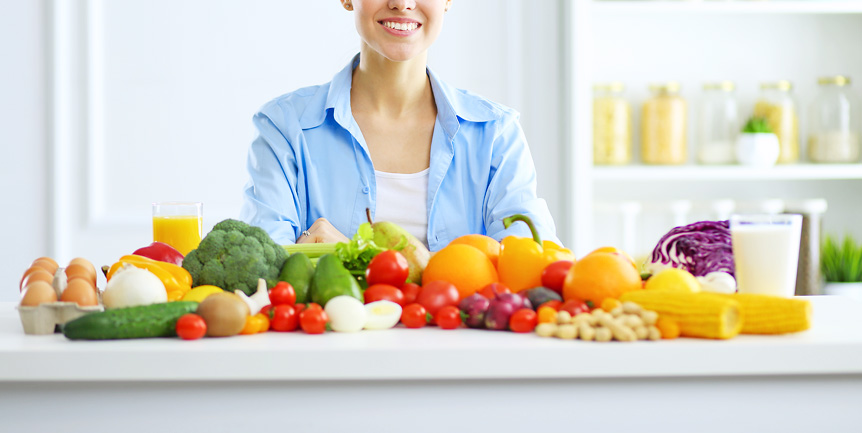CNA – While we’re well-acquainted with the adage “you are what you eat” and understand the need to eat healthily – less fried food, less sugar, more vegetables and fruits – we’re still not getting enough nutrients from our daily diet.
In fact, around 30 per cent of all women are deficient in at least one important vitamin or mineral, said principal dietitian at Raffles Diabetes and Endocrine Centre Bibi Chia. And for many women, the risk of nutritional deficiencies increases with age.
It doesn’t help that we subject our bodies to a slew of different diets – keto, low-carb, no-carb, vegan – which sometimes makes it harder to get the full suite of nutrients we need to keep us in good health.
When determining your nutrient needs, don’t look at your age. Instead, the experts say you should look at what life stage you’re in: Puberty, pregnancy, breastfeeding or post-menopausal.
If you’re pregnant or breastfeeding, you would need more of certain types of nutrients, such as protein, calcium, iron and folic acid, to support your health and the baby’s development, said Chia.

In the United States (US), girls aged nine to 18 are encouraged to increase their calcium and vitamin D intake “to build strong bones and help prevent osteoporosis later in life”.
Their intake of iron is also higher, at 18-19 milligrammes (mg) compared to 6mg-12mg for boys, she added.
NUTRIENTS WOMEN ARE NOT CONSUMING ENOUGH OF
Wondering why you’re anaemic, suffer from hair loss, experience leg cramps, or often feel fatigued and lethargic?
Those could be signs that you aren’t getting enough of specific nutrients, said dietitian and founder of Aptima Nutrition & Sports Consultants Jaclyn Reutens. The good news: “These could all be related to your diet and can be an easy fix,” she said.
Not surprisingly, iron deficiency (and its resulting anaemia) is one of the most common nutritional deficiencies in women because of menstruation. Chia added that women lose an average of 30 to 40 millilitres (ml) of blood from their periods.
But iron is just one of eight important nutrients that women need. Here’s what Chia and Reutens advise we should be consuming regularly as part of our diet.
1. Calcium
Why it’s important: Calcium is not only needed for bone health, it’s also necessary to help our heart, muscles and nervous system function properly.
Deficiency symptoms: Muscle cramps, weakness, numbness or tingling in the fingers and/or an abnormal heart rate. However, calcium deficiency is rare. “Calcium levels are tightly regulated by our kidneys. Your blood calcium levels are usually within the normal range but your bones can get depleted resulting in osteopenia (loss of bone mineral density) and osteoporosis,” Reutens explained.
Foods rich in it: Milk, cheese, yogurt, as well as dark green leafy vegetables, beans and sardines. A 200ml cup of milk contains 280mg of calcium, a cup of spinach has 245mg and 45g of cheese contains between 115mg and 150mg.
2. Folate (also known as Vitamin B9 or folic acid)
Why it’s important: For red blood cell formation so that our bodies function well. It’s also crucial for pregnant women, especially during the early stages of pregnancy when it helps with the foetus’ brain and spine formation.
Deficiency symptoms: Tiredness, weakness, shortness of breath, pale skin, hair loss and megaloblastic anaemia (a condition where the bone marrow products large, abnormally structured, immature red blood cells). In pregnant women, it can also result in neural tube defects in the foetus.
Foods rich in it: Wholegrain bread, beans, peas, lentils, asparagus, eggs, leafy greens, Brussels sprouts, broccoli and nuts. Half a cup of asparagus contains 134mcg of folate, one slice of wholewheat bread will give you 26 microgramme (mcg), and one large egg contains 22mcg.
3. Iodine
Why it’s important: Helps the body make thyroid hormones, thyroxine and triiodothyronine, which regulate metabolism. It also aids in bone and brain development in the foetus and in young children.
Deficiency symptoms: Fatigue, lethargy, weight gain, constipation, dry skin and hair, and sensitivity to the cold.
Foods rich in it: Fish and shellfish such as mackerel, oysters, mussels, squid and prawn, as well as milk, cheese, yogurt and eggs. Six oysters contain 140mcg of iodine, 100g of fish contains 50mcg, and 300ml of milk has 57mcg.
4. Iron
Why it’s important: It’s essential for transporting oxygen to all the tissues and organs in our body.
Deficiency symptoms: Fatigue, weakness, pale skin, sensitivity to the cold, shortness of breath, hair loss and brittle nails.
Foods rich in it: Red meat like beef, shellfish, beans, spinach and chickpeas. A 100 grammes (g) serving of beef contains 3.1mg of iron, 100g of spinach has 3.6mg and 100g of chickpeas contains 2.9mg.
5. Vitamin A
Why it’s important: Essential for healthy vision, immune function to defend against illness, and for reproduction.
Deficiency symptoms: Mild deficiency may cause fatigue, susceptibility to infections, and infertility, while a more serious deficiency can lead to night blindness, xerophthalmia (a severe dryness of the eye that if left untreated can lead to blindness), dry skin or hair, and irregular patches on the whites of the eyes.
Foods rich in it: Poultry, eggs, mackerel, fruits like mango, papaya and watermelon, as well as vegetables such as tomatoes, red capsicum and carrots, and cornflakes. A 100g serving of chicken contains 50mcg of vitamin A, 100g of duck will give you 69mcg, 100g of cornflakes has 812mcg, while 100g of red capsicum contains a whopping 1,510mcg.
6. Vitamin B12
Why it’s important: Helps with brain function, nerve tissue health, production of red blood cells and energy levels – it’s been linked to serotonin production (the chemical messenger that keeps us feeling happy).
Deficiency symptoms: Fatigue, weakness, nerve damage, megaloblastic anaemia, depression, memory loss and dementia.
Foods rich in it: Beef, tuna, fortified nutritional yeast, sardines and cheese. A 100g serving of beef contains 5.9mcg of vitamin B12, 100g of tuna has 10.9mcg, and 100g of cheese contains one mcg – three mcg.
7. Vitamin D
Why it’s important: Enhances the absorption of calcium to maximise bone health, while also supporting immune health.
Deficiency symptoms: Bone loss resulting in bone and back pain, depression, anxiety, frequently falling ill, fatigue, tiredness and impaired wound healing. Prolonged deficiency can also lead to rickets, a condition in infants and children that results in soft bones and skeletal deformities, and osteomalacia (weak and softened bones).
Foods rich in it: Egg yolks, oily fish like salmon and tuna, and fortified milk (milk that contains added vitamins and minerals that aren’t naturally present). A 100g serving of salmon contains 13mcg of vitamin D, one egg yolk has 1mcg and 250ml of milk has about 2.9mcg-3.1mcg.
8. Zinc
Why it’s important: Boosts immune health, metabolic function and reduces inflammation.
Deficiency symptoms: Delayed wound healing, hair loss, poor appetite, decreased sense of smell and taste, reduced immunity and depressed mood.
Foods rich in it: Red meat, poultry, oysters, nuts, seeds and fortified breakfast cereals (which contain extra vitamins and minerals that aren’t naturally present). A 100g serving of beef contains 4.8mg of zinc, one oyster has 5mg, and 30g of pine nuts, cashews or almonds contains 1mg-2mg.
DO WOMEN NEED TO SUPPLEMENT THEIR NUTRIENT INTAKE?
Supplements aren’t necessary if you’re in good health, said Chia. However, if you’re at risk of specific nutrient deficiencies, then you would benefit from including supplements in your diet. This can include those who have specific dietary requirements, like vegetarians and vegans. According to Chia, this group might be at risk of zinc deficiency as their food intake would be limited to whole grains, which “have lower bioavailability than from animal foods”.
Do keep in mind that supplements can’t replace whole foods. Said Reutens: “Plus, the absorption rate of the nutrients is better from foods.”
WHAT ELSE WOMEN SHOULD BE EATING
While nutrients are important, both dietitians advise women not to ignore food groups like carbohydrates, and fruits and vegetables.
“Diet culture has led many to believe that carbohydrates cause weight gain, and protein does not,” said Reutens.
“But carbohydrates, in particular starchy carbohydrates, found in rice, noodles, bread, pasta and potatoes, are an essential nutrient that gives you energy, a sense of satiety and improves your mood.”
Instead of cutting carbs out entirely, Reutens encourages portion control. As for fruits and vegetables, which are packed with vitamins A, C and E, as well as magnesium, zinc, phosphorous and folic acid, many of us are simply not eating enough of them.
“While the Health Promotion Board of Singapore recommends eating two servings of fruits and two servings of vegetables a day as part of a healthy diet, a large gap still exists between the recommended and actual intake,” Chia added.
She explained that eating sufficient fruit and vegetables is linked with a reduced risk of many non-communicable diseases. For instance, it may prevent osteoporosis in adults, thanks to their rich source of calcium and other vitamins vital to bone health.



















































